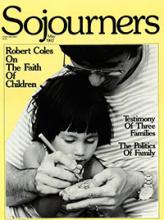When this interview appeared, Robert Coles was a child psychiatrist and writer who had worked for many years interviewing, documenting, and reflecting on the lives of people in all circumstances, particularly those of hardship and oppression. He had written more than 30 books, including the five-volume Children of Crisis and was working on a book about the development of moral and political values in children. In early 1982, Coles was interviewed by Robert Ellsberg, who was a Sojourners contributing editor at that time.
--The Editors
Robert Ellsberg: In discussing the faith of children, is it important to make distinctions between poor children and those who come from comfortable backgrounds?
Robert Coles: I think so. Many poor children in this country are living on the edge--if I may use Paul Tillich's expression. I think he meant it to apply in a theological rather than sociological sense. If you're hungry and don't know where your next meal is coming from, and if you're living in a ghetto or in a shack that has no sanitation or electricity and feeling down-and-out and worthless, then you're not far from the edge that Tillich and some of the existentialists had in mind.
You begin to ask why; and once people start asking why about their lives, fates, and destinies, they're entering religious inquiry. And children do that. But children who come from wealthy families are protected, among other things, from that question. They go to church on Sundays, some of them, but too often going to church is merely a Sunday ritual, and they're not near those marginal, down-and-out kinds of questions which, after all, were the questions Christ and his disciples came to terms with. Jesus and his followers were marginal people; Christ's particular kind of existence was not an accident.
Read the Full Article

